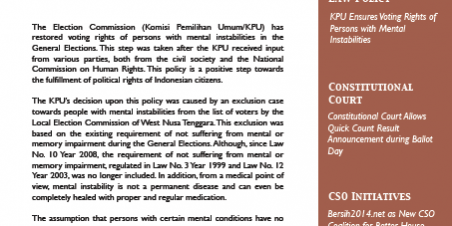Law Policy
KPU Ensures Voting Rights of Persons with Mental Instabilities
The Election Commission (Komisi Pemilihan Umum/KPU) has restored voting rights of persons with mental instabilities in the General Elections. This step was taken after the KPU received input from various parties, both from the civil society and the National Commission on Human Rights. This policy is a positive step towards the fulfillment of political rights of Indonesian citizens.
The KPU’s decision upon this policy was caused by an exclusion case towards people with mental instabilities from the list of voters by the Local Election Commission of West Nusa Tenggara. This exclusion was based on the existing requirement of not suffering from mental or memory impairment during the General Elections. Although, since Law No. 10 Year 2008, the requirement of not suffering from mental or memory impairment, regulated in Law No. 3 Year 1999 and Law No. 12 Year 2003, was no longer included. In addition, from a medical point of view, mental instability is not a permanent disease and can even be completely healed with proper and regular medication.
The assumption that persons with certain mental conditions have no voting rights in the General Elections is a false stigma and must be abolished. The KPU’s policy in ensuring the voting rights of persons with mental conditions is accurate and should be a permanent policy in upcoming elections. (FN)
Constitutional Court
Constitutional Court Allows Quick Count Result Announcement during Ballot Day
The Article 245 par.3 of Law No. 10 Year 2008 on the General Election of the House of Representatives, House of Regional Representatives, and Regional House of Representatives stipulates that quick count results can only be announced at the earliest on the day after ballot day. The rationale behind the article is to minimize unwanted consequences due to such announcements. In an instant, the polling industry questioned the article and made a petition to the Constitutional Court, challenging the constitutionality of the article. The court declared the article as null and void.
In 2012, the House of Representatives passed Law No. 8 Year 2012 on the General Election of the House of Representatives, House of Regional Representatives, and Regional House of Representatives. Interestingly, the law also regulated similar provisions, which had been declared as null and void by the Constitutional Court. Article 247 par. 2 prohibits the announcement of quick count results before 2 (two) hours after the voting process in Western Indonesia Time (WIB). The difference between the stipulation in Article 245 par.3 Law No. 10 Year 2008 and article 247 par.2 Law No. 8 Year 2012 lies only in the timeframe limitation. Article 247 Law No. 8 Year 2012 gives a limitation of 2 hours after the voting process in Western Indonesia Time for quick count results to be announced, whereas Article 245 par.3 limits it to the next day after ballot day. The two articles have substantial similarity; in its latest decision, the Constitutional Court consistently upheld their ruling to declare such stipulations as unconstitutional, thus considering them null and void. (GAT)
CSO Initiatives
Bersih2014.net as New CSO Coalition for Better House Members
A coalition of prominent CSOs on human rights, legal reform, anti-corruption and environmental groups, namely KontraS, PSHK, ICW, Walhi and KPA (Land Consortium Reform) launched a website called “Bersih2014” (Clean2014). The coalition aims to endorse supposedly ‘clean’ candidates for both regional and national House members in the 2014 legislative election. Up until Election Day on 9 April 2014, there were 97 candidates endorsed by the coalition.
The website gained a total of 6 million hits since it first launched on 25 March 2014 and reached 1,2 million hits on the last day before voters cast their ballots. Voting results for candidates featured on the Bersih2014 website have yet to be confirmed since the counting process is still ongoing, but the enthusiasm surely sparks hope that voters are not as apolitical as we first thought. (GPD)

